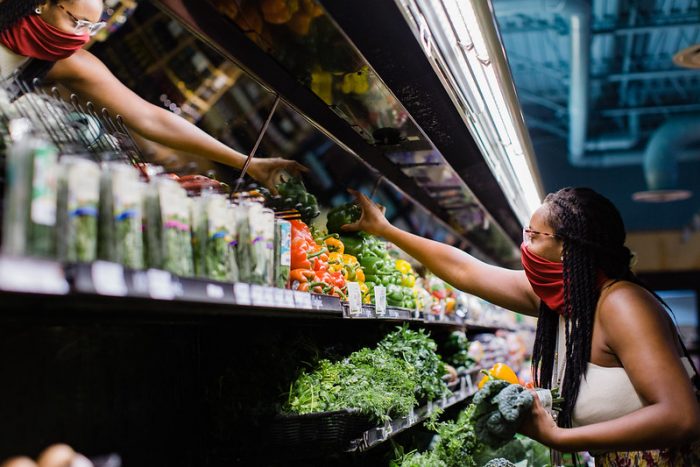I have always been an advocate for organic produce—happily paying just a little bit, or a lot, more for a quality product that I believed was better for my family’s health (and mine).
I’d fill my supermarket trolley with as much organically-labelled fruit and vegetables as I could, fully under the belief that I was making the best health choice by buying organic.
So imagine my disappointment to discover some truths about supermarket organic produce that left a bit of a bad taste in my mouth.
Ever wondered why produce is available all year round regardless of the season?
We, consumers, want access to all foods in all seasons, and why shouldn’t we? We have become used to these items being readily available—we create a demand that supermarkets need to fulfill to beat their competitors.
Let’s not be under the illusion that supermarket staff are lovingly tending to their fruits and vegetables because they want us to be in the best of health. It’s a lovely thought, but in the cold, hard light of day, supermarket staff want their pay packets, and supermarket bosses want the biggest profits.
Profits come from satisfying consumers, even if this means our food has travelled thousands of miles to make it onto the shelf, creating a huge carbon footprint so that we can access bananas in Britain and mangoes in Norway.
I pondered whether I really wanted to keep buying organic produce that wasn’t local or seasonal.
A further consideration was whether the supermarket produce was even fresh. As a nutritional therapy student, I am aware of how important it is to consume the right nutrients—I don’t fancy eating 10 nutritionally defective vegetables per day to try and fill my quota, when I could be eating five fresh items that are nutritionally dense.
The sad truth is that it fulfills the supermarket business objective if the consumer spends money on that tasty, fresh-looking bag of organic apples, even if it is actually a year old.
Yes, you heard me right. Some produce, such as potatoes and apples, can be stored for up to a year in temperature-controlled environments. According to Foodrenegade, one investigation showed that on average, apples on sale in supermarkets were 14 months old.
The Harvard Medical School Center for Health and the Global Environment suggests that food that has travelled a long way to make it onto our shelves is not likely to be as nutritious as locally sourced produce—not to mention the environmental repercussions from the massive carbon footprint of importing all these organic items that are out of season in a particular country.
In light of this, I made the switch from the illusion of fresh supermarket organic to non-organic, locally-sourced fruit and vegetable boxes and never looked back. My fruit and vegetable boxes get delivered to me from a farm 11 miles away from where I live—it is picked and delivered within 24 hours, and there is little plastic packaging involved.
I spoke to David Fryer, the founder of Groobarbs wild farm in the United Kingdom, to ask him how he runs things.
For a start, he hates chemicals—this is music to my ears. He is speaking to me from a field full of squash, which he informs me is full of weeds due to the lack of chemicals they use. The more I speak to him, the more I can sense how much he loves what he does.
“Why is it okay that all your salads and root vegetables from supermarkets are all washed in chlorinated water?” He writes on his blog—and it’s a fair point.
I asked him what the difference was between his produce and organic. He informed me that they are almost organic, but to fulfill the organic status, he would need to have farmed the same fields for three years—his continued expansion of the farm, and crop rotation means they have been unable to fulfill that status as yet.
What I really wanted to know is what chemicals they use. I found out that they use a spray called “Tracer,” which complies with organic farming standards. So although their produce does not have the label of organic, which so many of us, including myself, have bought into for the sake of health, the fact is, that this non-organically, labelled-locally farm is always going to be more nutritionally superior to supermarket organic that has been sitting in storage for an unknown length of time.
Do we really need to eat strawberries all year round?
I invite you to eat seasonally and fresh, thereby reducing the environmental impact of food mileage and increasing your own nutritional intake from local produce. Many of this produce is more or less organic, just without the label.
It is up to us to stop creating the demand for produce that we are eating non-seasonally. If the demand is not there, the supermarkets won’t have to fulfill that need, which would have the knock-on effect of decreasing pressure on farmers to produce the highest yields for the lowest prices that aren’t always nutritionally sound, especially with nonorganic farming, which uses countless types of pesticides—yummy (not).
Why not check out our local farms for fruit and vegetable supplies? Most farmers will be happy to spare a few minutes to chat about their produce, and buying directly from them means they don’t lose out to big chain supermarkets.
The money goes straight into their pockets to allow them to do more of the thing that they do best—providing quality produce that is grown with love.
~











Read 13 comments and reply